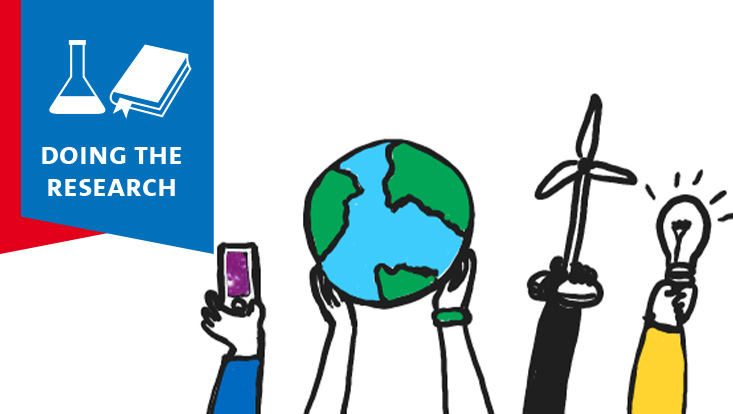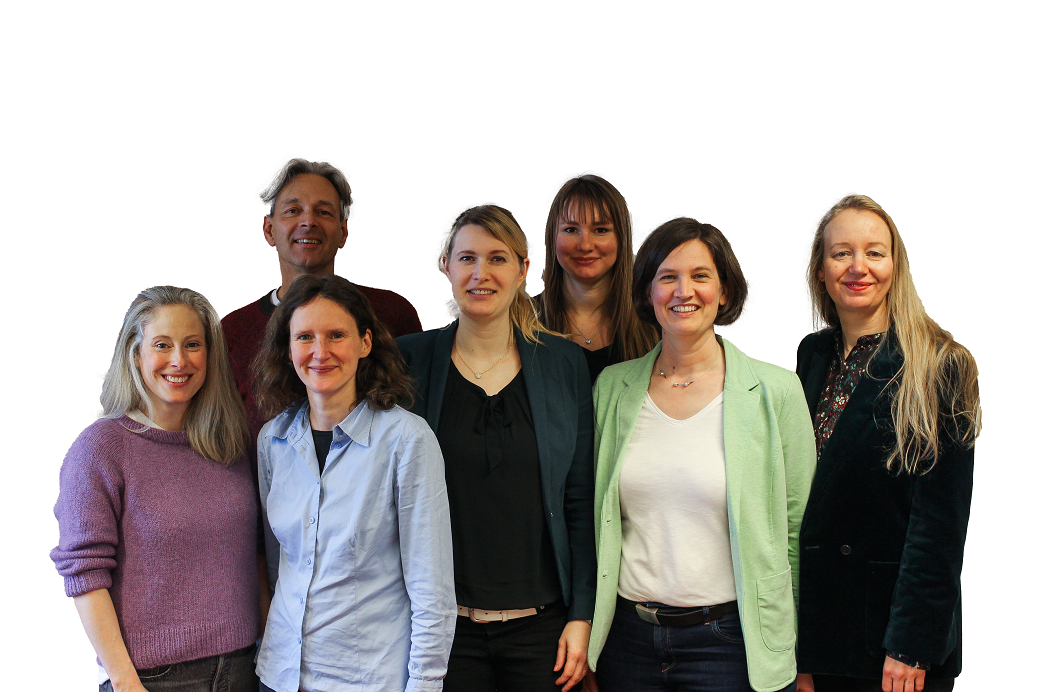Sustainable STEM teaching“Networked Thinking Must Be Learned and Promoted”Doing the Research series
7 August 2023, by Anna Priebe

Photo: Universität Hamburg / Schulz
Many current problems, such as climate change, are very complex. In school, however, these topics are taught separately from the perspective of the respective subject. The MINT4all project wants to bring the various subject perspectives together. PD Dr. habil. Katrin Vorhölter and Prof. Dr. Sandra Schulz from the Faculty of Education’s explain how this could work.
STEM lessons are normally usually taught separately by subject—for example, mathematics, informatics, or physics. What is the problem with that?
Schulz: To understand the complex issues and problems of our world, we need networked thinking—and that needs to be learned and promoted, for example, by bringing subjects together in school. This is already done in many other countries: in the United States, for example, there are interdisciplinary science lessons. In Germany, there are a lack of studies on whether interdisciplinary lessons actually promote networked knowledge more compared to lessons that teach subjects separately.
Vorhölter: We know that knowledge exchange does not happen automatically. School students do not readily apply knowledge acquired in one subject to another or to problems outside school. The bringing together of knowledge must be guided. However, we are also aware that sound subject knowledge is necessary to deal with complex problems. Thus, each subject has to retain its importance.

A complicated mélange . . .
Vorhölter: Yes, it is. We also face the challenge that, in Germany, teacher-training students study specific subjects—as a result, they see themselves as experts only in these subjects. Thus, if a mathematics teacher is suddenly asked to teach an informatics class, they initially feel overwhelmed. So that has to be well embedded and guided.
Schulz: However, you have to say that there are also finer gradations between a lesson that is not networked at all and the complete dissolution of the individual subjects. For the introduction in schools, you have to design learning environments and materials that have a linking component. There is a lot of room for maneuver.
How would you describe the teaching concept you developed?
Schulz: In our project, we look specifically at the issue of climate change and CO2 emissions. One subject alone is not sufficient to understand how this can be reduced. Therefore, we have developed so-called learning environments on this topic for 9th grade classes.
Vorhölter: There is an experimental test group that implements the 2 new learning environments. They involve about 3 weeks of school lessons in 3 subjects: Mathematics, informatics, and physics or mathematics, informatics, and geography Both subject knowledge and networking knowledge are measured with tests before and after the intervention.
In addition, there is a control group for which we have also developed specific lessons: They address the same content, but this is classically addressed in separate subject lessons. Thus, the focus on networking is missing here. However, we are testing the school students with the same tests and want to see whether networking knowledge in the experimental group has increased more significantly than in the control group. It is also especially interesting for us to see whether subject knowledge develops in the same way.
We deliver a concept that schools can adopt directly.
So the schools receive a comprehensive package?
Schulz: We deliver an overall concept that schools can adopt directly, that conforms to the existing syllabi, and that takes into account, for example, the specified number of hours for the subjects. Ultimately, the schools should also be able to use it after the study. There is no point in developing a project that works great in theory but falls flat in practice.
Vorhölter: We supply everything that is needed to carry out the lessons. This means that the teachers receive material to prepare themselves for the lessons and to be able to implement the overall concept. But we also provide concrete teaching material, both digital and analog, such as individual worksheets, summary slides, and help with specific questions or problems.
Mathematics is a particular focus in the lessons you develop. Why?
Vorhölter: As a focus subject, mathematics has a certain number of hours and is used as a language in subjects such as informatics, physics, and—to some extent—geography. Actually, school students have already acquired many of the mathematical concepts required for this in previous grades. However, studies show that they are often unable to apply these concepts flexibly to intra- and extramathematical problems.
Therefore, in our project, we revisit his content from earlier grades and focus on mathematical modeling skills, which are precisely about solving real-life problems with the help of mathematical methods. This enables students to also gain a deeper understanding of the basic mathematical methods used.
What is the status of the project?
Schulz: The application phase for schools will start after the summer vacation. We plan to start implementation in classes at the beginning of next year—the start of the second half of the school year.
How do you assess the schools’ willingness to think differently?
Vorhölter: I have been working in Hamburg for 12 years with very different but always very committed teachers. Furthermore, the new Hamburg education plans stipulate that ESD—that is, education for sustainable development—must be integrated into subject lessons. Therefore, schools will have to develop appropriate concepts in the coming years. We are offering them the opportunity to test such a concept now. Thus, we hope for lively participation, including from teachers who might still be somewhat skeptical. We can show them ways in which it can work.
Schulz: We not only want to see what the effects of subject-separated and subject-linked lessons are but also want to identify the conditions for success. Where are there problems and fears? Where is there a need for professional development? These are questions that we are also addressing in the research project.
The MINT4all project
The MINT4all project is funded by the Federal Ministry of Education and Research with approximately €600,000 and will run until the end of 2025 (funding code: 16MF1017). In addition to Prof. Dr. Sandra Schulz and PD Dr. habil. Katrin Vorhölter, Prof. Dr. Dietmar Höttecke (professor of physics education), Prof. Dr. Sandra Sprenger (professor of geography education), Prof. Dr. Marcus Schütte (professor of mathematics education for primary education), and 3 research assistants from the Department of Social Sciences, Mathematics and Natural Sciences Education are involved.
Doing the Research
There are approximately 6,200 academics conducting research at 8 faculties at Universität Hamburg. Many students also often apply their newly acquired knowledge to research practice while still completing their studies. The Doing the Research series outlines the broad and diverse range of the research landscape, and provides a more detailed introduction of individual projects. Feel free to send any questions and suggestions to the Newsroom editorial office(newsroom"AT"uni-hamburg.de).


